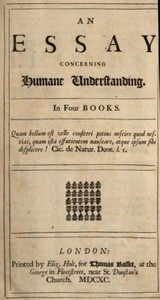
An Essay Concerning Humane Understanding, Volume 1: MDCXC, Based on the 2nd Edition, Books 1 and 2
Locke, John
Category: Knowledge, Theory of -- Early works to 1800
1. Title: An Examination of Human Understanding - John Locke (Volume 1)
2. Summary: In this excerpt from the first volume of John Locke's "An Examination of Human Understanding," he discusses the intricate relationship between ideas, language, and knowledge. The text highlights the importance of abstract ideas in shaping our understanding and emphasizes the significance of clear communication for effective learning and teaching.
3. Key Insights:
- Our knowledge is based on propositions (statements or assertions).
- Ideas and words are closely related, with abstract ideas having a constant relation to general words.
- The nature, use, and signification of language are essential for understanding how our understanding employs these elements to form knowledge.
4. Practical Applications:
- Improve clarity in communication by using precise words that accurately reflect your ideas.
- Understand the importance of abstract ideas in shaping our general understanding.
- Develop awareness of the role language plays in forming and sharing knowledge.
- Cultivate the habit of speaking and writing clearly to promote effective communication.
- Be conscious of the relationship between words, ideas, and knowledge when learning or teaching new concepts.
5. Quote: "Our knowledge is all consisting in propositions" (Locke)
6. Final Takeaway: By examining the connection between ideas, language, and knowledge, Locke's work encourages us to improve our communication skills for better understanding and shared wisdom.
2. Summary: In this excerpt from the first volume of John Locke's "An Examination of Human Understanding," he discusses the intricate relationship between ideas, language, and knowledge. The text highlights the importance of abstract ideas in shaping our understanding and emphasizes the significance of clear communication for effective learning and teaching.
3. Key Insights:
- Our knowledge is based on propositions (statements or assertions).
- Ideas and words are closely related, with abstract ideas having a constant relation to general words.
- The nature, use, and signification of language are essential for understanding how our understanding employs these elements to form knowledge.
4. Practical Applications:
- Improve clarity in communication by using precise words that accurately reflect your ideas.
- Understand the importance of abstract ideas in shaping our general understanding.
- Develop awareness of the role language plays in forming and sharing knowledge.
- Cultivate the habit of speaking and writing clearly to promote effective communication.
- Be conscious of the relationship between words, ideas, and knowledge when learning or teaching new concepts.
5. Quote: "Our knowledge is all consisting in propositions" (Locke)
6. Final Takeaway: By examining the connection between ideas, language, and knowledge, Locke's work encourages us to improve our communication skills for better understanding and shared wisdom.
Summary
1. Title: An Examination of Human Understanding - John Locke (Volume 1)
2. Summary: In this excerpt from the first volume of John Locke's "An Examination of Human Understanding," he discusses the intricate relationship between ideas, language, and knowledge. The text highlights the importance of abstract ideas in shaping our understanding and emphasizes the significance of clear communication for effective learning and teaching.
3. Key Insights:
- Our knowledge is based on propositions (statements or assertions).
- Ideas and words are closely related, with abstract ideas having a constant relation to general words.
- The nature, use, and signification of language are essential for understanding how our understanding employs these elements to form knowledge.
4. Practical Applications:
- Improve clarity in communication by using precise words that accurately reflect your ideas.
- Understand the importance of abstract ideas in shaping our general understanding.
- Develop awareness of the role language plays in forming and sharing knowledge.
- Cultivate the habit of speaking and writing clearly to promote effective communication.
- Be conscious of the relationship between words, ideas, and knowledge when learning or teaching new concepts.
5. Quote: "Our knowledge is all consisting in propositions" (Locke)
6. Final Takeaway: By examining the connection between ideas, language, and knowledge, Locke's work encourages us to improve our communication skills for better understanding and shared wisdom.
2. Summary: In this excerpt from the first volume of John Locke's "An Examination of Human Understanding," he discusses the intricate relationship between ideas, language, and knowledge. The text highlights the importance of abstract ideas in shaping our understanding and emphasizes the significance of clear communication for effective learning and teaching.
3. Key Insights:
- Our knowledge is based on propositions (statements or assertions).
- Ideas and words are closely related, with abstract ideas having a constant relation to general words.
- The nature, use, and signification of language are essential for understanding how our understanding employs these elements to form knowledge.
4. Practical Applications:
- Improve clarity in communication by using precise words that accurately reflect your ideas.
- Understand the importance of abstract ideas in shaping our general understanding.
- Develop awareness of the role language plays in forming and sharing knowledge.
- Cultivate the habit of speaking and writing clearly to promote effective communication.
- Be conscious of the relationship between words, ideas, and knowledge when learning or teaching new concepts.
5. Quote: "Our knowledge is all consisting in propositions" (Locke)
6. Final Takeaway: By examining the connection between ideas, language, and knowledge, Locke's work encourages us to improve our communication skills for better understanding and shared wisdom.
Is this summary inaccurate?
Please log in to report issues with this summary.
Reviews
No ratings yet
Please log in to leave a review.
No reviews yet. Be the first to review this summary.